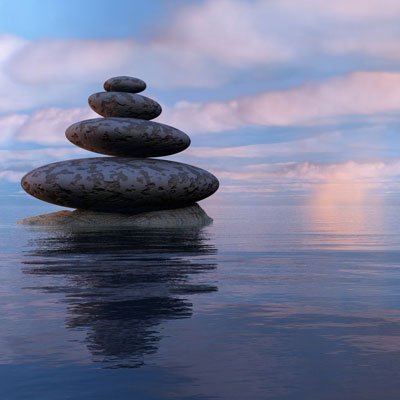Inner harmony comes from recognizing that certain attitudes and feelings make us feel harmonious and others do not. It comes from noticing how we feel when we think in a certain way, from being aware of our own inner states and what has caused these inner states. Doing this is not hard, but it does take attention.
First of all, let’s look at what causes disharmony within us. Anger, guilt, fear, worry, self-doubt, disrespect for yourself and others-these undesirable attitudes cause us untold problems and difficulties. We should always be on guard against slipping into these states of consciousness. For not only do these cause us harm, but in a very real way they affect the consciousness of the entire planet.
Each of us adds or diminishes to the whole of consciousness by the way in which we think. Our strength adds strength. Our weakness weakens the whole. Our inner harmony or disharmony has an effect, just as a pebble dropped into a pond causes ripples throughout the entire pond. We are always affecting the whole by how and what we think.
Let me share with you an incident that illustrates this.
A number of years ago I was speaking at a university and I was explaining this exact same principle. I said that the root of problems with environmental pollution – the killing of the whales, drift net fishing, industrial waste – lay not with the decisions of companies and governments, but with our own inner anger and disrespect.
“The energy we emit into consciousness is what is killing the whales,” I said. “There will be no change until there is a change of consciousness within, and we are all players in the game.” I went on, “Until we take responsibility for our own inner harmony, we’re part of the problem.”
Well, one woman took offence to this. She disagreed with me vehemently. “I’m not killing the whales,” she screamed at me, going on to share what environmental groups she belonged to and all the good work she was doing.
I tried to respond but she wouldn’t let me.
She worked herself into a rage and for the next few minutes, the worst type of venom spewed from her mouth as she denounced both me and my ideas. Obviously, I had touched a raw nerve with her. As her anger turned to rage you could feel the atmosphere of the whole room become charged with toxic energy. When she was finished she stormed out of the room, calling me several obscenities as she left.
The room became eerily silent. Nobody said anything.
Everyone was wide-eyed and aware and clear. We looked at one another knowingly. What I had been talking about was no longer just a concept. We had all witnessed it in action and felt its effect. I couldn’t have asked for a better demonstration. It was a great revealing moment for everyone present because everyone ‘got it’ instantly.
I still feel shivers when I think about it. So if you wish to be socially responsible but cannot look after your own inner kingdom, you are fooling yourself. If you truly wish to help the world, begin by working within.
There are no passengers on spaceship Earth; we are all crew.
-Marshall McLuhan
Paradoxically, when our inner harmony becomes not just a means to happiness but a social responsibility, we have a far greater incentive to achieve it. Our work on inner harmony no longer becomes selfish or self-indulgent, but rather an important part of the quest for world peace and harmony.
Let me put it another way. Indulging in self-pity weakness and inner disharmony is not a private act. When, through laziness, ignorance or self-indulgence, you allow disharmony within, you harm and affect the whole.
This is an excerpt from The Practice of Happiness, a book by John Kehoe.

